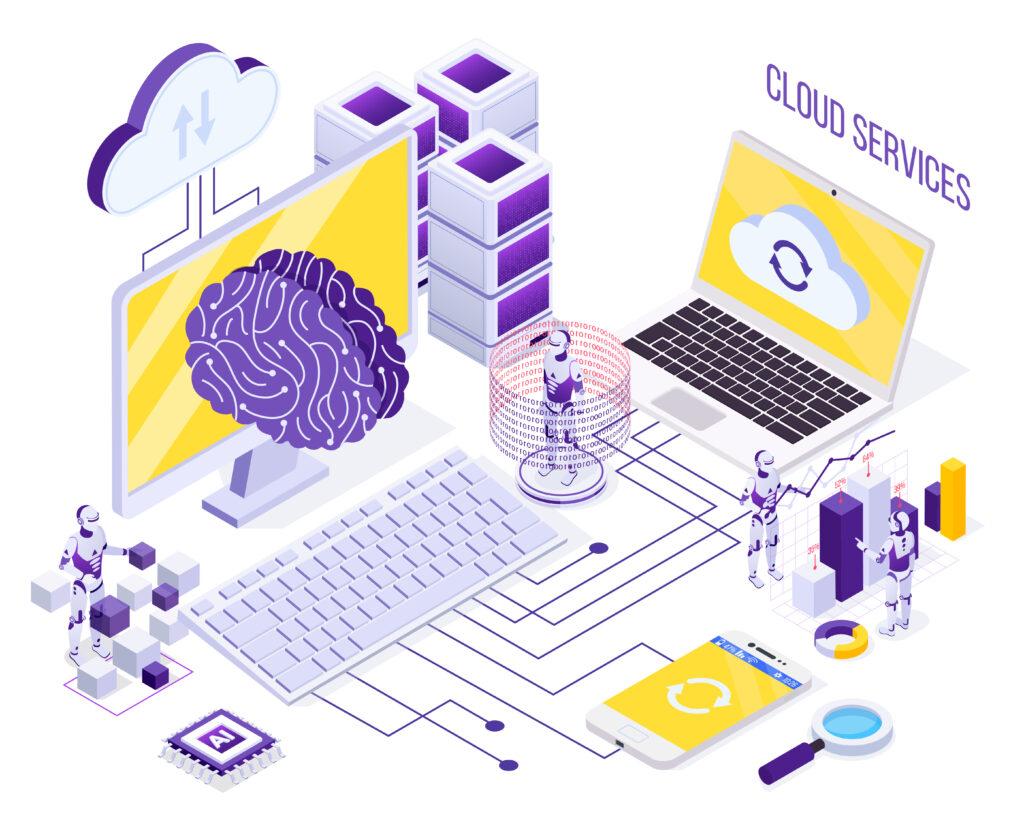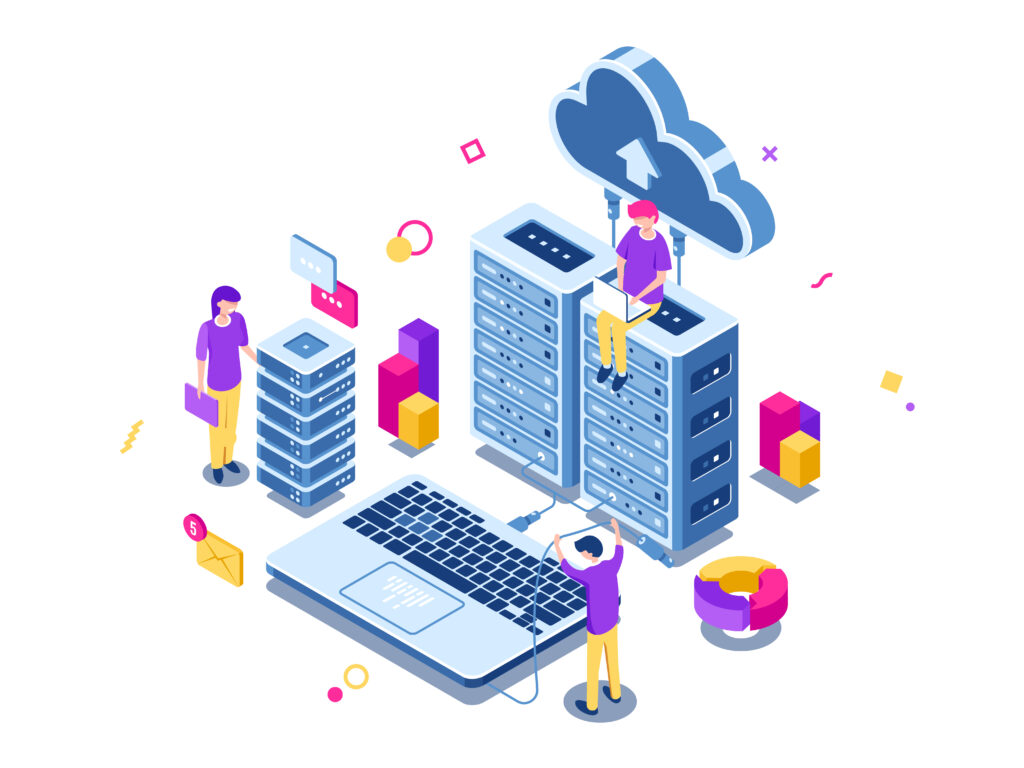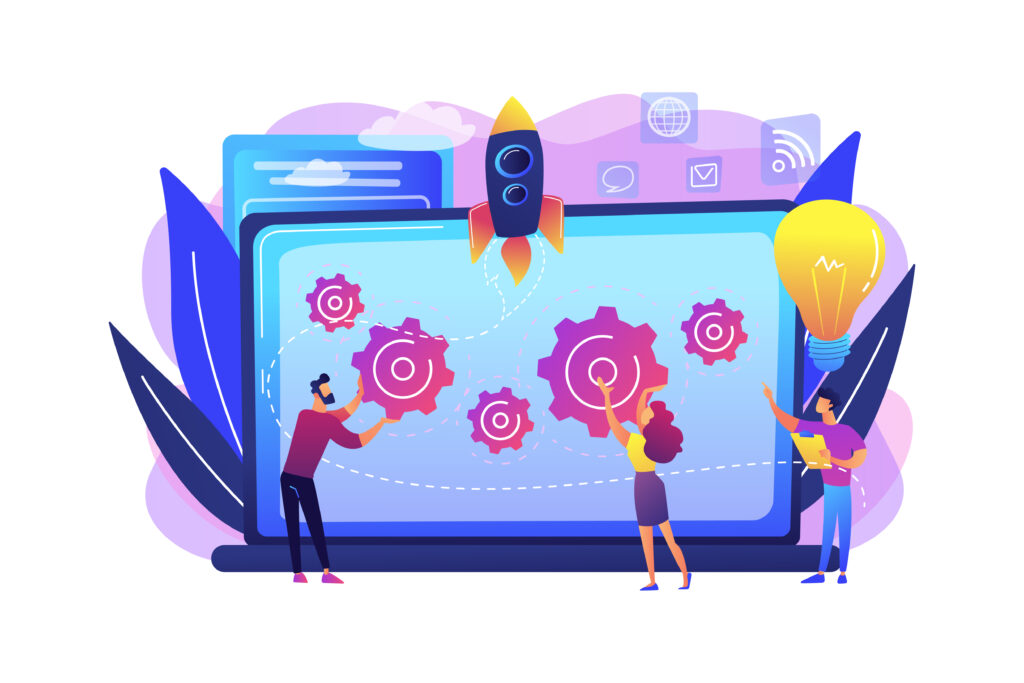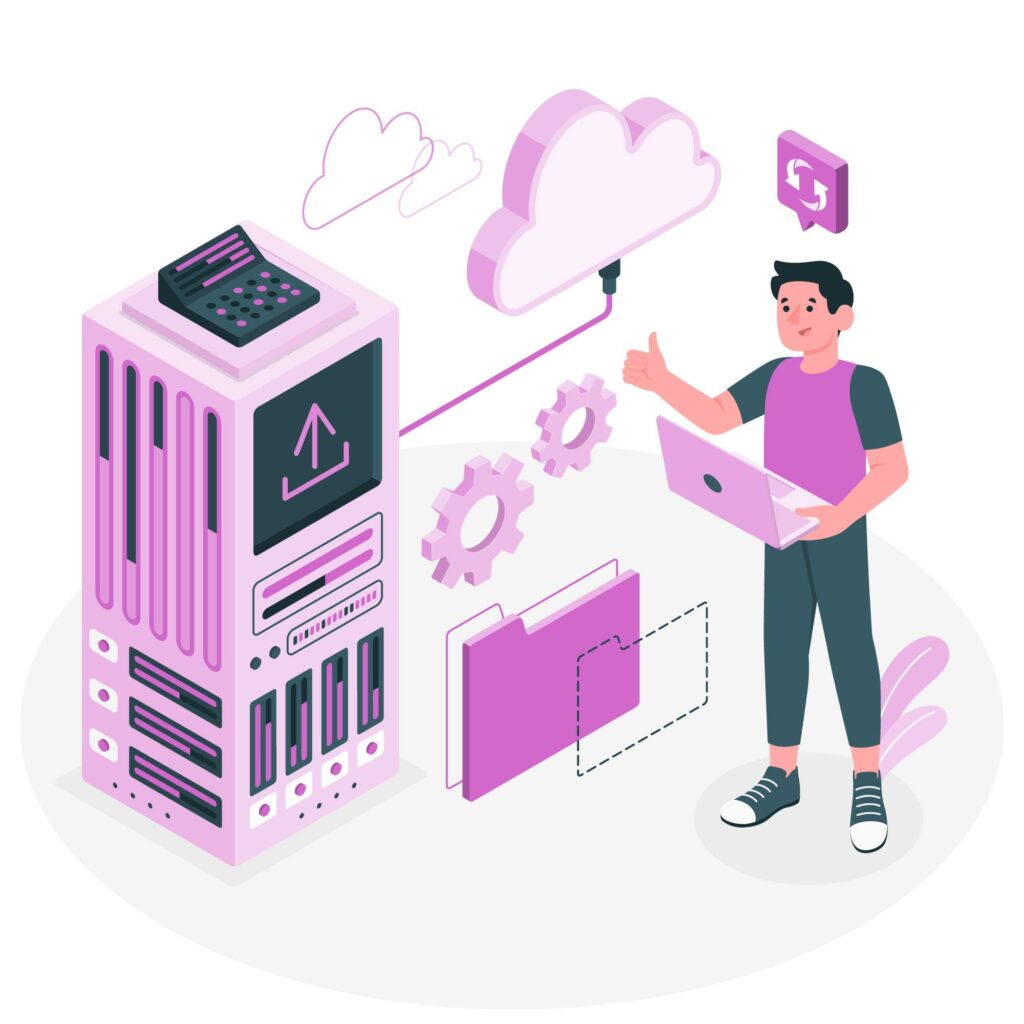What is AI Cloud?
AI Cloud refers to a comprehensive cloud-based ecosystem that offers seamless, on-demand access to artificial intelligence and machine learning tools through robust AI computing in the cloud. This cutting-edge approach empowers businesses to create, implement, and oversee AI-powered applications and services without relying on significant investments in on-premises hardware.

Core Definition
AI Cloud serves as a dynamic platform that seamlessly integrates advanced AI technologies with scalable cloud resources. It enables organizations to harness:
- Machine learning tools
- Advanced analytics capabilities
- Natural language processing
- Computer vision technologies
- On-demand computational resources
Key Features of AI Cloud: A Comprehensive Exploration
1. Pre-Built AI Services
AI Cloud platforms offer a comprehensive suite of pre-built AI services, enabling businesses to rapidly deploy machine learning models without the need for extensive in-house development. These services are easily accessible through API calls, providing businesses of all sizes with access to cutting-edge AI capabilities. Key offerings include:
- Image Recognition Technologies
AI models for object detection, facial recognition, and visual data analysis in industries like healthcare, retail, and security.
- Natural Language Processing (NLP) Tools
Tools for automating text analysis, sentiment analysis, and chatbots to process unstructured data and enhance customer interactions.
- Predictive Modeling Frameworks
Pre-built models for forecasting trends, customer behavior, and business outcomes, enabling smarter decision-making and risk mitigation.
- Real-Time Recommendation Systems
Personalized recommendations for products, content, or services, enhancing user experience and engagement across platforms like e-commerce, media streaming, and social networks.
- Language Translation Services
AI-powered translation tools that provide real-time, accurate translations for global communication and customer support.
These pre-built AI services streamline the integration of advanced technologies into business processes, saving time and resources while ensuring businesses remain competitive in an AI-driven world.
2. Flexible Scalability
AI Cloud provides exceptional scalability, offering businesses the ability to adjust computational resources according to their evolving needs. Key aspects of its scalability include:
- Dynamic Resource Allocation
AI Cloud platforms can automatically adjust resources based on workload demands, ensuring optimal performance without overprovisioning. This flexibility allows businesses to handle fluctuating demands efficiently.
- Pay-Per-Usage Pricing Models
The cloud’s pricing model enables businesses to only pay for the resources they actually use, significantly reducing costs compared to traditional, fixed infrastructure models. This approach helps companies control spending while scaling up or down.
- Instant Scaling Capabilities
With AI Cloud, businesses can rapidly scale up or down to meet the demands of their applications. Whether it’s handling a surge in traffic or reducing capacity during off-peak times, instant scalability ensures that resources are always aligned with project needs.
- Support for Experimental and Production-Level Projects
AI Cloud is ideal for both research and development (R&D) as well as production-level applications. It supports the experimentation phase with flexible testing environments and easily transitions into scalable, production-ready solutions.
- Cost-Effective Infrastructure Management
By optimizing resource allocation and providing scalable infrastructure, AI Cloud platforms offer cost-effective management, helping businesses maintain control over their infrastructure without compromising on performance or capabilities.
3. Advanced Data Management

AI Cloud platforms are designed to handle vast amounts of data efficiently, offering powerful tools and features to optimize data storage, processing, and management. Key aspects include:
- Cloud-Based Data Warehouses
AI Cloud platforms integrate with scalable, cloud-based data warehouses, providing centralized storage solutions. These warehouses are optimized for high-speed data access and management, enabling businesses to store and analyze large datasets without the limitations of traditional on-premise solutions.
- Sophisticated Data Lakes
Data lakes offer a flexible and scalable solution for storing both structured and unstructured data. AI Cloud platforms utilize advanced data lake architectures, allowing organizations to store raw, diverse datasets in a cost-effective manner, while making it easy to query and process the data for advanced analysis.
- Advanced Storage Solutions
With AI Cloud, businesses can leverage high-performance storage systems tailored to AI workloads. These solutions ensure that data is readily available for analysis, regardless of its size, type, or complexity. Cloud storage systems also support redundancy and high availability, reducing the risk of data loss.
- Robust Data Cleaning Mechanisms
AI Cloud platforms feature built-in tools to clean and preprocess data, ensuring that businesses work with accurate, high-quality datasets. These mechanisms can detect anomalies, handle missing values, and normalize data, streamlining the data preparation process.
- Processing Support for Structured and Unstructured Data
AI Cloud supports both structured data (e.g., databases) and unstructured data (e.g., text, images, videos). This versatility enables businesses to gain insights from a wide variety of data sources, powering more comprehensive and accurate AI models.
4. Automated Machine Learning (AutoML)
Automated Machine Learning (AutoML) revolutionizes the way businesses develop and deploy AI models by automating key processes, making AI more accessible and efficient. Its main benefits include:
- Automating the Model-Building Process
AutoML automates many stages of the AI model development lifecycle, including data preprocessing, model selection, and hyperparameter tuning. This reduces the need for extensive manual intervention and expert knowledge, making AI model creation faster and easier for teams with varying levels of expertise.
- Performing Intelligent Feature Selection
AutoML uses advanced algorithms to automatically identify the most relevant features from datasets. This process optimizes the model’s performance by selecting the right inputs and eliminating irrelevant or redundant features, thereby improving the model’s accuracy and efficiency.
- Optimizing Model Training
AutoML tools optimize model training by fine-tuning hyperparameters, selecting the best training algorithms, and adjusting model architectures. These optimizations ensure that models are trained in the most effective way possible, accelerating the overall development process.
- Simplifying Data Science Tasks
AutoML simplifies complex data science tasks, such as model evaluation, feature engineering, and cross-validation. By automating these tasks, businesses can focus on higher-level strategy and implementation, reducing the complexity of AI development.
- Accelerating Solution Development Timelines
With AutoML, organizations can drastically reduce the time it takes to move from model conceptualization to deployment. This rapid development cycle enables businesses to quickly implement AI-driven solutions, gaining a competitive edge and addressing challenges more efficiently.
5. Intelligent Infrastructure
AI Cloud relies on state-of-the-art computational resources that are essential for running complex AI models efficiently. These resources enable rapid processing and advanced functionalities for various AI applications, supporting businesses in achieving their goals. Key components include:
- High-Performance GPU Processing
Graphics Processing Units (GPUs) are crucial for accelerating AI computations, especially in deep learning tasks. AI Cloud platforms use high-performance GPUs to handle large-scale data processing and training deep learning models faster than traditional CPUs, enabling organizations to scale their AI workloads seamlessly.
- Advanced TPU Technologies
Tensor Processing Units (TPUs) are specialized hardware accelerators developed by Google, designed to boost the performance of machine learning tasks. AI Cloud platforms leverage TPUs for high-speed model training and inference, providing a significant performance boost in AI workloads, particularly for large-scale neural networks.
- Distributed Training Frameworks
AI Cloud supports distributed training, allowing machine learning models to be trained across multiple computing nodes simultaneously. This enables faster training times, even for large and complex models, by distributing the workload and balancing computational resources efficiently.
- Complex Computational Support
AI Cloud platforms provide powerful computational support for sophisticated AI algorithms, enabling organizations to run computationally intensive tasks like simulations, optimization, and large-scale analytics without the constraints of traditional infrastructure.
- Deep Learning Optimization
AI Cloud uses advanced deep learning optimization techniques, such as model parallelism and mixed-precision training, to ensure efficient use of resources while maintaining high model accuracy. These optimizations improve the performance and scalability of deep learning models, allowing businesses to tackle more demanding AI tasks effectively.
6. Comprehensive Security
AI Cloud platforms integrate comprehensive security measures to safeguard sensitive data and ensure robust protection across all AI-driven processes. These advanced features work together to create a secure environment for data storage, processing, and communication. Key security capabilities include:
- Advanced Threat Detection Systems
AI Cloud leverages machine learning algorithms to detect and analyze potential security threats in real-time. These systems can identify unusual patterns or behaviors within the network, helping to pinpoint potential risks and vulnerabilities before they escalate into major security incidents.
- Real-Time Cybersecurity Monitoring
Continuous monitoring of the cloud infrastructure ensures immediate identification and response to cybersecurity breaches or anomalies. Real-time tracking enables the prompt detection of malicious activities, ensuring that organizations can take quick action to prevent security breaches or data loss.
- Automated Security Protocols
AI Cloud platforms implement automated security measures such as encryption, firewall configurations, and multi-factor authentication. These automated protocols help to enforce security policies consistently and without delay, reducing human error and potential gaps in the security system.
- Anomaly Identification Mechanisms
Using AI-driven anomaly detection, cloud platforms can recognize patterns that deviate from normal operational behavior. This capability provides an additional layer of protection by quickly flagging suspicious activities and potential threats to data integrity or security.
- Proactive Risk Mitigation
AI Cloud platforms incorporate proactive risk management strategies to predict and prevent potential security threats. By continuously evaluating the system for weaknesses and vulnerabilities, they enable organizations to implement timely security updates and prevent unauthorized access or data breaches.
7. Model Inference Engines
AI Cloud platforms integrate sophisticated model inference engines that empower organizations to deploy and utilize machine learning models with remarkable efficiency and scalability. These engines are designed to support real-time data processing and model application, optimizing performance across a variety of industries. Key features include:
- Highly Scalable Prediction Systems
AI Cloud provides the infrastructure to scale predictive models seamlessly as the demand for computations grows. These scalable systems ensure that businesses can handle increased data loads and larger volumes of predictions without compromising performance or speed.
- Real-Time Model Applications
AI Cloud platforms facilitate the application of trained machine learning models to new data in real-time, providing immediate insights and actionable predictions. This capability is crucial for businesses that require timely decision-making, such as financial institutions or healthcare providers.
- Rapid Decision-Making Support
By processing data and generating predictions quickly, model inference engines support faster, more informed decision-making. This enhances the ability of businesses to respond to dynamic market conditions and internal operational demands swiftly.
- Computational Efficiency Optimization
Inference engines optimize computational resources, ensuring that machine learning models execute predictions with minimal latency while maximizing efficiency. This reduces the need for over-provisioning infrastructure and lowers overall computational costs.
- Seamless Model Deployment
AI Cloud simplifies the deployment of machine learning models into production environments. With integrated tools for continuous deployment, businesses can update or replace models easily, ensuring their systems stay current with the latest advancements in AI technology.
8. Cross-Platform Integration

AI Cloud platforms are designed to work seamlessly across diverse systems and technologies, ensuring businesses can integrate their AI capabilities without disrupting existing workflows. With strong cross-platform support, AI Cloud enables organizations to fully leverage their technological investments and expand their operational capabilities. Key features include:
- Integration with Existing Systems
AI Cloud platforms facilitate smooth integration with legacy systems, enterprise software, and other existing infrastructure. This ensures that businesses can incorporate AI into their workflows without the need for major system overhauls, maximizing the value of their current technologies.
- Multi-Programming Language Support
AI Cloud provides compatibility with a wide range of programming languages, including Python, Java, R, and more. This flexibility allows developers to work with the languages they are most comfortable with or those that best suit their project needs, streamlining the development process.
- Analytics Platform Compatibility
AI Cloud platforms integrate seamlessly with leading analytics and data visualization tools, enabling businesses to gain insights from their AI models quickly. Whether it’s BI platforms, dashboards, or data lakes, AI Cloud supports a broad range of analytics services to enhance decision-making.
- IoT Service Connectivity
AI Cloud supports connectivity with IoT (Internet of Things) devices, facilitating the collection and processing of data from a variety of sensors and connected devices. This enhances real-time analytics and decision-making across industries like manufacturing, healthcare, and logistics.
- Flexible Deployment Options
AI Cloud offers businesses the flexibility to deploy their AI models across on-premises, private, or public cloud environments. This allows for optimized performance, cost savings, and the ability to scale operations according to business needs.
9. Intelligent Automation
AI Cloud platforms significantly enhance operational efficiency by automating complex processes and optimizing workflows, allowing businesses to streamline operations, reduce human error, and improve overall productivity. Key features of intelligent automation include:
Process Automation Capabilities
AI Cloud enables the automation of repetitive, rule-based tasks, freeing up valuable resources for more strategic activities. By leveraging machine learning and advanced algorithms, businesses can automate processes such as data entry, reporting, and system monitoring, improving efficiency and reducing operational costs.
- AI-Driven Workflow Optimization
AI Cloud optimizes workflows by analyzing data patterns and identifying inefficiencies. By automating the flow of information and tasks across departments, it ensures smoother transitions between processes, reduces delays, and accelerates decision-making. - Intelligent Chatbot Technologies
AI Cloud integrates advanced chatbot solutions to automate customer interactions, support functions, and other service-based tasks. These intelligent chatbots provide 24/7 support, answer frequently asked questions, and direct inquiries to the appropriate departments, improving customer service while reducing the need for manual intervention.
- Reduction in Manual Interventions
AI-driven automation minimizes the reliance on human intervention for routine tasks, reducing the potential for errors and increasing speed. Employees can focus on higher-level decision-making while AI handles the repetitive and time-consuming tasks.
- Productivity Enhancement
By automating key processes and streamlining workflows, AI Cloud enhances employee productivity, accelerates project timelines, and enables businesses to deliver faster results. It empowers organizations to scale operations without the need for proportional increases in workforce size.
10. Predictive Analytics
AI Cloud equips businesses with powerful predictive analytics tools that help transform raw data into valuable insights, guiding strategic decision-making and driving long-term growth. These capabilities enable organizations to forecast trends, identify patterns, and make data-driven decisions with confidence. Key features of predictive analytics include:
- Sophisticated Data Analysis Tools
AI Cloud provides a range of advanced tools that enable businesses to analyze large datasets quickly and effectively. By leveraging machine learning algorithms, AI Cloud can uncover hidden insights, providing a deeper understanding of customer behavior, market trends, and operational efficiencies.
With AI Cloud, businesses can automatically detect patterns in data that might be overlooked by traditional analytics methods. These patterns can reveal insights into customer preferences, operational bottlenecks, and potential risks, allowing companies to make more informed decisions based on real-time data.
- Trend Forecasting Mechanisms
AI Cloud leverages predictive models to forecast future trends based on historical data. These mechanisms help businesses anticipate market shifts, consumer demands, and potential disruptions, enabling proactive strategies to stay ahead of competitors.
- Business Intelligence Insights
By synthesizing data from various sources, AI Cloud generates comprehensive business intelligence insights. These insights enable executives to make well-informed decisions about resource allocation, marketing strategies, and investment opportunities, optimizing business performance.
- Strategic Decision-Making Support
AI Cloud empowers leaders with data-driven insights that improve strategic decision-making. With access to accurate predictions and actionable recommendations, businesses can develop informed strategies to enhance efficiency, reduce costs, and seize new opportunities.
Benefits of AI Cloud

Democratized Technology Access
AI Cloud democratizes advanced AI technologies, enabling businesses of all sizes to benefit. It provides pre-built machine learning models, eliminates the need for in-house development, and lowers barriers to AI adoption with scalable, flexible solutions.
Cost-Effectiveness
AI Cloud reduces upfront hardware investments, lowers operational costs by up to 40%, and minimizes maintenance expenses. Pay-per-use pricing and mitigation of technological obsolescence ensure financial efficiency.
Comprehensive Capabilities
AI Cloud offers high-performance GPU and TPU processing, APIs, distributed computing frameworks, and end-to-end AI lifecycle support for cutting-edge innovation.
Enhanced Security
Data protection features include advanced threat detection, real-time monitoring, automated protocols, and anomaly detection for proactive risk management.
Hybrid Strategies
Flexible deployment options include seamless integration across clouds, cross-platform compatibility, and reduced vendor lock-in risks.
Performance Optimization
Dynamic resource allocation, predictive maintenance, and AI-driven monitoring enhance efficiency and minimize downtime.
Intelligent Automation
Automation tools optimize workflows, reduce manual intervention, and boost productivity through chatbots and virtual assistants.
Data-Driven Decisions
Rapid processing, pattern recognition, and trend forecasting empower strategic decision-making and actionable insights.
Collaborative Innovation
Global accessibility fosters teamwork, remote development, knowledge sharing, and accelerated innovation cycles.
Top AI Cloud Providers
Amazon Web Services (AWS) AI
AWS leads the AI cloud market with a diverse range of services.
Key Services:
- AWS Bedrock: Managed foundation models via a single API.
- Amazon SageMaker: Simplifies ML model creation and deployment.
- AWS Deep Learning AMIs: Pre-configured VMs with popular frameworks.
- Amazon EC2: Scalable compute resources for AI workloads.
Strengths:
- Extensive pre-trained model library.
- Robust security and privacy features.
- Support for TensorFlow, PyTorch, and more.
Microsoft Azure AI
Azure excels with its OpenAI integration and versatile AI capabilities.
Key Services:
- Azure OpenAI Service: A generative AI platform.
- AI Infrastructure: Scalable resources for AI tasks.
- Custom AI Models: Tailored to specific business needs.
Strengths:
- Direct OpenAI model access.
- Microsoft ecosystem compatibility.
- Advanced security and compliance.
Google Cloud AI
Google stands out with cutting-edge AI technologies and ML expertise.
Key Services:
- Vertex AI: Unified platform for AI development.
- Gemini AI Models: Advanced large language models.
- MLOps Tools: Optimize ML operations.
Strengths:
- Open-source integration.
- Advanced analytics for insights.
Comparative Insights
AWS leads in traditional AI, Azure excels in generative AI, and Google specializes in open-source and ML frameworks, empowering diverse business needs.
Real-World Applications of AI Cloud
AI Cloud computing has fundamentally changed how industries harness artificial intelligence, delivering scalable, flexible, and accessible platforms that drive innovation across sectors.
1. Healthcare Innovations
-
- Medical Diagnosis Enhancement: AI-powered systems analyze extensive datasets to improve diagnostic accuracy.
-
- Drug Discovery Acceleration: Predicts viable drug candidates and expedites clinical trial analysis.
-
- Personalized Medicine: Creates tailored treatment plans based on genetic and medical data.
- Efficient Data Management: Automates administrative tasks and streamlines data processing.
2. Financial Services
-
- Fraud Detection: Real-time monitoring to identify suspicious activities.
-
- Transaction Analysis: Ensures secure financial operations.
-
- Predictive Analytics: Analyzes market trends for strategic decision-making.
- Automated Financial Services: Streamlines loan approvals and wealth management.
3. Business Intelligence
-
- Task Automation: Improves efficiency and reduces operational costs.
-
- Data-Driven Insights: Supports informed decision-making with predictive analytics.
-
- Customized AI Solutions: Tailored to specific business needs.
- Enhanced Customer Experience: Utilizes intelligent chatbots for client engagement.
4. Industrial and Manufacturing Applications
-
- Predictive Maintenance: Reduces downtime by anticipating equipment failures.
-
- Operational Efficiency: Optimizes resource allocation and workflows.
-
- Real-Time Quality Control: Ensures consistent product standards.
- Process Optimization: Enhances productivity through workflow analysis.
5. Additional Sector Applications
-
- Retail: Personalized product recommendations.
-
- Transportation: Autonomous systems and intelligent routing.
-
- Education: Adaptive learning platforms for personalized experiences.
- Cybersecurity: Advanced threat detection and proactive data protection.
Future Innovations in AI Cloud
1. Advanced Computational Infrastructure
-
- Custom AI Hardware: Azure Maia AI accelerator and Cobalt CPU series.
- Advanced Virtual Machines: AMD Instinct GPUs and NVIDIA Hopper integration.
2. Generative AI Capabilities
-
- Multi-Format Content Generation: Text, image, video, and code production.
- Productivity Enhancement: Pre-built models for efficient deployment.
3. Confidential Computing
-
- Secure Environments: Confidential VMs with NVIDIA H100 GPUs.
- Compliance-Centric Solutions: Industry-specific regulatory adherence.
4. MLOps Advancements
- Model Management: Advanced versioning, monitoring, and deployment tools.
5. AI-Powered Accessibility
- Enhanced Vision Technologies: GPT-4 Turbo integration and improved video descriptions.
6. Hybrid and Multi-Cloud Solutions
- Edge Computing Integration: Real-time insights and IoT connectivity.
7. Performance Optimization
- Automated Resource Allocation: Intelligent management for reduced latency.
[Want to learn more about AI Cloud? Click here to reach us.]
Conclusion
The AI Cloud is rapidly shaping the future of scalable AI solutions by providing businesses with the tools they need to innovate, optimize, and grow. Its ability to integrate advanced computational infrastructure, enable real-time analytics, and deliver personalized experiences is revolutionizing industries across the board.
From healthcare and finance to manufacturing and education, AI Cloud empowers organizations to harness the full potential of artificial intelligence with unprecedented flexibility and efficiency.
For businesses looking to leverage these advancements, Bobcares offers comprehensive AI development and support services. Whether it’s designing custom AI solutions, optimizing cloud-based AI workflows, or providing expert technical support, Bobcares ensures that companies can seamlessly adopt and scale AI technologies to meet their unique needs.
As technologies like generative AI, hybrid cloud strategies, and confidential computing continue to evolve, the possibilities for AI Cloud are boundless. By bridging accessibility gaps and ensuring robust performance, the AI Cloud—backed by expert services like those provided by Bobcares—is not only redefining what’s possible but also setting the stage for a more intelligent and connected future.







0 Comments